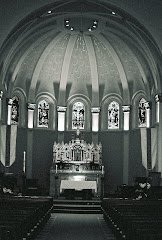Advent 2011 we will begin using the new translation of the Roman Missal. This will include all of the permanent responses and words at Mass called the ‘ordinary’, and it includes all the prayers that change from week to week known as the ‘propers’. Someone asked me: Father, why do we need a new translation. That is an excellent question. Let’s look at some answers.
1. In 2001 the document Liturgiam authenticam was promulgated. This gave new principles for translastion. In the past, they translated very loosely so it was easy to understand. This was not the most accurate translation. The new principles call to translate words and syntax. The goal is now exact and accurate translation.
2. In 2000 the third edition of the Roman Missal was promulgated by Pope John Paul II. This is the Latin version of the mass. With a new addition we need a new translation.
3. The Current translation strays from the original Latin, so it is not accurate. This also means that the English translation does not match the translations of the other languages of the world. As a universal church our translations should agree.
4. The current translation lacks some of the rich language and imagery, especially biblical language. We should recognize the scriptural references.
5. Some of the language is theologically imprecise and can lead people to errors. We want theological precision to avoid any errors.
Liturgy is central to the life of the Church. Through the liturgy we are made present to Christ’s paschal mystery and renews our baptismal commitment to further the saving ministry of Christ. Our worship and prayer will effect we believe and live as Christians. The words of liturgy matter because they express the faith of the people.
The goal of the new translation is to give a deeper sense of the mystery of God’s presence. It will be an excellent opportunity for fuller catechesis on the Mass and Christian living. It will give a more visible unity among all Roman Rite Catholics. And finally, it will be a time to renew our Eucharistic theology, spirituality and practice.
Here is think to the new translation of the Mass:
http://www.usccb.org/romanmissal/order-of-mass.pdf
The Dedication of the Holy Sepulchre
-
In the Byzantine Rite, there are three observances on the calendar today.
The first is a very ancient feast adopted from the liturgical tradition of
the ci...
10 hours ago




